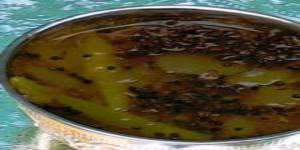
Scope
Pachadi refers to a traditional South Indian fresh pickle served as a side dish. Broadly translated, it refers to food which has been pounded. In Karnataka, Kerala and Tamil Nadu, pachadi is a side dish curry and is made with vegetable, yoghurt, coconut, ginger and curry leaves and seasoned with mustard.
Pachadi generally is a mildly spiced coconut and yogurt-based dish made with seasonal vegetables or fruits. It is made of fresh vegetables and is served as an accompaniment for rice and for snacks like idli, dosa, and pesarattu. Many kinds of vegetables are included. Sometimes the peel of a vegetable is used, such as the peel of the ridged gourd, cucumber, etc.
Ingredient and Process of Cooking
Any Vegetable – 12 palam
Salt – palam
Tamarind – palam
Mustard Seeds – ¼ palam
Red Chillies – ¼ palam
Sesame Seeds – ¼ palam
Grated Coconut – 2 palam
Turmeric – r.e
Salt – ¼ palam
Asafoetida – 2 ku.a
- 1. Boil 1 padi of pure water and add any variety of cut vegetables or tubers. Once they are 3/4th boiled, add salt to it.
- 2. Then set aside from the fire and drain the water. Dissolve and de-seed tamarind in 3/8 padi pure water in a lead coated vessel and boil it.
- 3. Put the vegetables in it. Sprinkle water and grind to a smooth paste using mustard seeds, red chillies, sesame seeds, grated coconut and turmeric.
- 4. Mix it with ¼ padi water and pour it into the pachadi. Add salt to the pachadi and mix well.
- 5. After 10 minutes remove it from the fire and season it. Dissolve asafoetida in water and mix it with the pachadi.
- 6. White pumpkin, snake gourd, gooseberry, mango, raw banana, cucumber, lady’s finger can be used. Potato, sweet potato, turnip, beetroot are the tubers which can be used.
References
Hindu Bhaga Sasthiram: Click Here
Hindu Compliance Body
The Hindu compliance body was established under the executive order of The Supreme Pontiff of Hinduism, dated August 14, 2020, order number 10010, under the title Reviving the Hindu Compliance System and Body
to create, promote, spread and teach the standard procedures for all products and services that are in compliance Hindu Shastras.
Copyright
HCS has the copyright of all its publications. No part of these publications may be reproduced in any form without the prior permission in writing to HCS. This does not preclude the free use, in the course of implementing standard, of necessary details mentioned above. Enquiries related to copyrights to be addressed to KAILASA.
